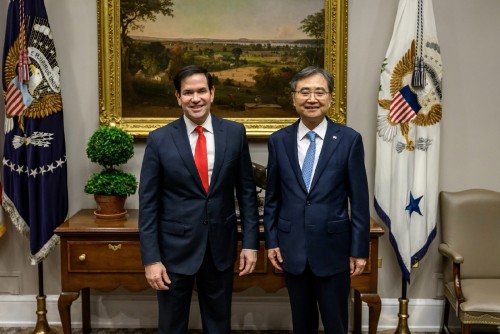 |
| South Korean Foreign Minister Cho Hyun (left) poses for a photo with U.S. Secretary of State and National Security Advisor Marco Rubio after their meeting in Washington, D.C., on August 22. / Provided by the Ministry of Foreign Affairs |
Foreign Minister Cho Hyun is set to meet with U.S. Secretary of State and National Security Advisor Marco Rubio in Canada during the G7 Foreign Ministers’ Meeting, as Seoul and Washington continue to negotiate the details of a pending “fact sheet” outlining agreements on trade and security cooperation.
According to the Ministry of Foreign Affairs, South Korea will participate in the G7 ministerial talks, held in Canada from November 11 to 14, as an invited guest nation.
Cho is scheduled to attend sessions on maritime security and prosperity, energy security, and critical minerals. Diplomatic sources said that regardless of the format—whether a bilateral meeting or an informal encounter—Cho and Rubio are expected to discuss unresolved aspects of the fact sheet.
The main sticking points concern the construction site and fuel supply for South Korea’s planned nuclear-powered submarines. U.S. President Donald Trump said on October 30 that the submarines could be built at Philadelphia Shipyard, recently acquired by Hanwha Ocean, while South Korean National Security Advisor Wi Sung-lac countered last week that “building them in the U.S. is not under consideration.”
Although speculation had circulated that the fact sheet on tariff and security negotiations might be released before the G7 meetings, most observers now see that as unlikely this week.
The two sides have reportedly struggled to narrow differences over where the submarines will be built.
Another sensitive issue is whether the submarines’ enriched uranium fuel would be supplied by the U.S.—a step that would require revising the Korea-U.S. Nuclear Cooperation Agreement (the 123 Agreement).
Coordination among several U.S. agencies has delayed progress, with Washington’s State, Defense, Energy, and Commerce departments all involved in drafting the text.
When asked about the timing of the announcement, Cho said on November 6, “The message we received from the State Department was simply to ‘wait a little longer.’ I understand the U.S. side is conducting final checks among its relevant agencies.”
Article 13 of the 123 Agreement prohibits the military use of nuclear materials, effectively preventing South Korea from acquiring rights to enrich or reprocess nuclear fuel for submarines.
Any modification would therefore require high-level bilateral consultations.
Kim Tae-hwang, professor of international trade at Myongji University, said, “Because both sides must consider their national interests and how the submarine deal will be perceived by neighboring countries, negotiations will inevitably take time. Even once the fact sheet is released, discussions over the 123 Agreement and construction site could continue for years.”
He added that even if Cho and Rubio meet in Canada, substantive progress may be limited. “Decisions on major issues like the submarine construction site or nuclear agreement revisions will ultimately be made by President Trump,” Kim said. “The G7 meeting could serve mainly to fine-tune technical details.”
Most Read
-
1
-
2
-
3
-
4
-
5
-
6
-
7





















